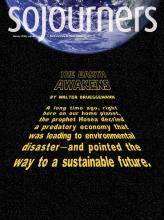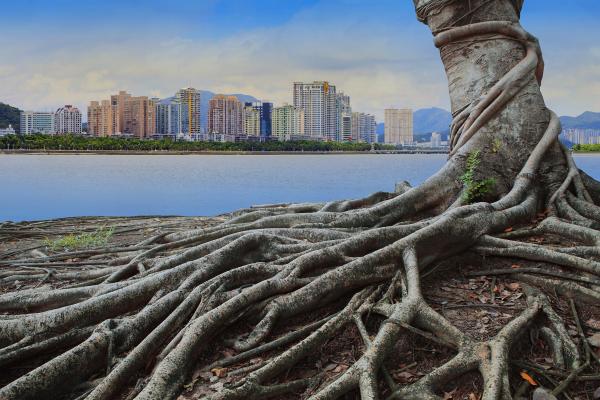WHEN WE CONSIDER the crisis of climate change, many of us swing back and forth between a narrative of despair in which “there is nothing we can do” and a narrative of hope that affirms that good futures are available when we act responsibly. Surely Laudato Si’, the encyclical released by Pope Francis last spring, has given enormous impetus to the narrative of possibility, summoning us to act intentionally and systemically about climate change.
The issue of climate change is a recent one, but the matter of revivifying the creation is a very old one in faith. In ancient Israel, as now, care for creation required a vision of an alternative economy grounded in fidelity.
The economy of ancient Israel, a small economy, was controlled and administered by the socio-political elites in the capital cities of Samaria in the north and Jerusalem in the south. Those elites clustered around the king and included the priests, the scribes, the tax collectors, and no doubt other powerful people. Those urban elites extracted wealth from the small, at-risk peasant-farmers who at best lived a precarious subsistence life. The process of extraction included taxation and high interest rates on loans. These were financial arrangements that drove many of the peasants into hopeless debt so that they were rendered helpless in the economy.
While that arrangement was exploitative, it no doubt appeared, at least from an urban perspective, to be normal, because the surplus wealth and the high standard of living it made possible seemed natural and guaranteed. The power people who operated the economy could assume surplus wealth, and the exploited peasants were impotent in the face of that power. The arrangement appeared to be safe to perpetuity.
Speeches of judgment
Except that a strange thing happened in ancient Israel in the eighth century B.C.E. (750-700 B.C.E.). There appeared in Israel, inexplicably, a series of unconnected, uncredentialed poets who by their imaginative utterance disrupted that seemingly secure economic arrangement. We characteristically list in that period of Israelite history four prophets—Amos, Hosea, Isaiah, and Micah. They came from various backgrounds, but they shared a common passion and a stylized mode of evocative speech.
The “normative” economy of the period had assumed that the economy consisted of only two participants: 1) the productive peasants, and 2) the urban elites, who did not work or produce anything but who lived well off of peasant produce. Those uncredentialed poets, however, dared to imagine and to utter that there was, inescapably, a third participant in the political economy: namely, the emancipatory God of the Exodus.
Read the Full Article

